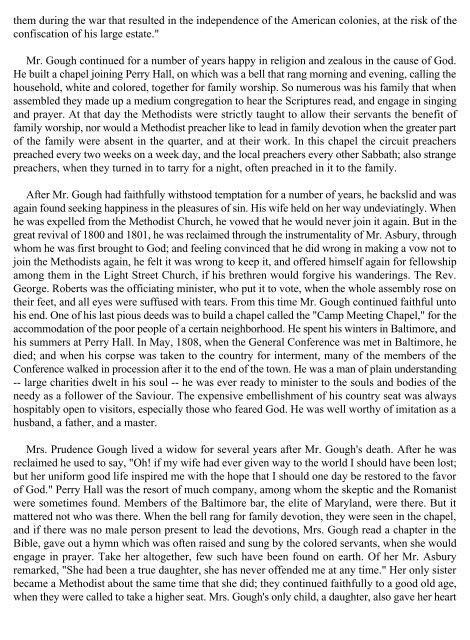A History Of The Rise Of Methodism In America - Media Sabda Org
A History Of The Rise Of Methodism In America - Media Sabda Org
A History Of The Rise Of Methodism In America - Media Sabda Org
You also want an ePaper? Increase the reach of your titles
YUMPU automatically turns print PDFs into web optimized ePapers that Google loves.
them during the war that resulted in the independence of the <strong>America</strong>n colonies, at the risk of the<br />
confiscation of his large estate."<br />
Mr. Gough continued for a number of years happy in religion and zealous in the cause of God.<br />
He built a chapel joining Perry Hall, on which was a bell that rang morning and evening, calling the<br />
household, white and colored, together for family worship. So numerous was his family that when<br />
assembled they made up a medium congregation to hear the Scriptures read, and engage in singing<br />
and prayer. At that day the Methodists were strictly taught to allow their servants the benefit of<br />
family worship, nor would a Methodist preacher like to lead in family devotion when the greater part<br />
of the family were absent in the quarter, and at their work. <strong>In</strong> this chapel the circuit preachers<br />
preached every two weeks on a week day, and the local preachers every other Sabbath; also strange<br />
preachers, when they turned in to tarry for a night, often preached in it to the family.<br />
After Mr. Gough had faithfully withstood temptation for a number of years, he backslid and was<br />
again found seeking happiness in the pleasures of sin. His wife held on her way undeviatingly. When<br />
he was expelled from the Methodist Church, he vowed that he would never join it again. But in the<br />
great revival of 1800 and 1801, he was reclaimed through the instrumentality of Mr. Asbury, through<br />
whom he was first brought to God; and feeling convinced that he did wrong in making a vow not to<br />
join the Methodists again, he felt it was wrong to keep it, and offered himself again for fellowship<br />
among them in the Light Street Church, if his brethren would forgive his wanderings. <strong>The</strong> Rev.<br />
George. Roberts was the officiating minister, who put it to vote, when the whole assembly rose on<br />
their feet, and all eyes were suffused with tears. From this time Mr. Gough continued faithful unto<br />
his end. One of his last pious deeds was to build a chapel called the "Camp Meeting Chapel," for the<br />
accommodation of the poor people of a certain neighborhood. He spent his winters in Baltimore, and<br />
his summers at Perry Hall. <strong>In</strong> May, 1808, when the General Conference was met in Baltimore, he<br />
died; and when his corpse was taken to the country for interment, many of the members of the<br />
Conference walked in procession after it to the end of the town. He was a man of plain understanding<br />
-- large charities dwelt in his soul -- he was ever ready to minister to the souls and bodies of the<br />
needy as a follower of the Saviour. <strong>The</strong> expensive embellishment of his country seat was always<br />
hospitably open to visitors, especially those who feared God. He was well worthy of imitation as a<br />
husband, a father, and a master.<br />
Mrs. Prudence Gough lived a widow for several years after Mr. Gough's death. After he was<br />
reclaimed he used to say, "Oh! if my wife had ever given way to the world I should have been lost;<br />
but her uniform good life inspired me with the hope that I should one day be restored to the favor<br />
of God." Perry Hall was the resort of much company, among whom the skeptic and the Romanist<br />
were sometimes found. Members of the Baltimore bar, the elite of Maryland, were there. But it<br />
mattered not who was there. When the bell rang for family devotion, they were seen in the chapel,<br />
and if there was no male person present to lead the devotions, Mrs. Gough read a chapter in the<br />
Bible, gave out a hymn which was often raised and sung by the colored servants, when she would<br />
engage in prayer. Take her altogether, few such have been found on earth. <strong>Of</strong> her Mr. Asbury<br />
remarked, "She had been a true daughter, she has never offended me at any time." Her only sister<br />
became a Methodist about the same time that she did; they continued faithfully to a good old age,<br />
when they were called to take a higher seat. Mrs. Gough's only child, a daughter, also gave her heart
















